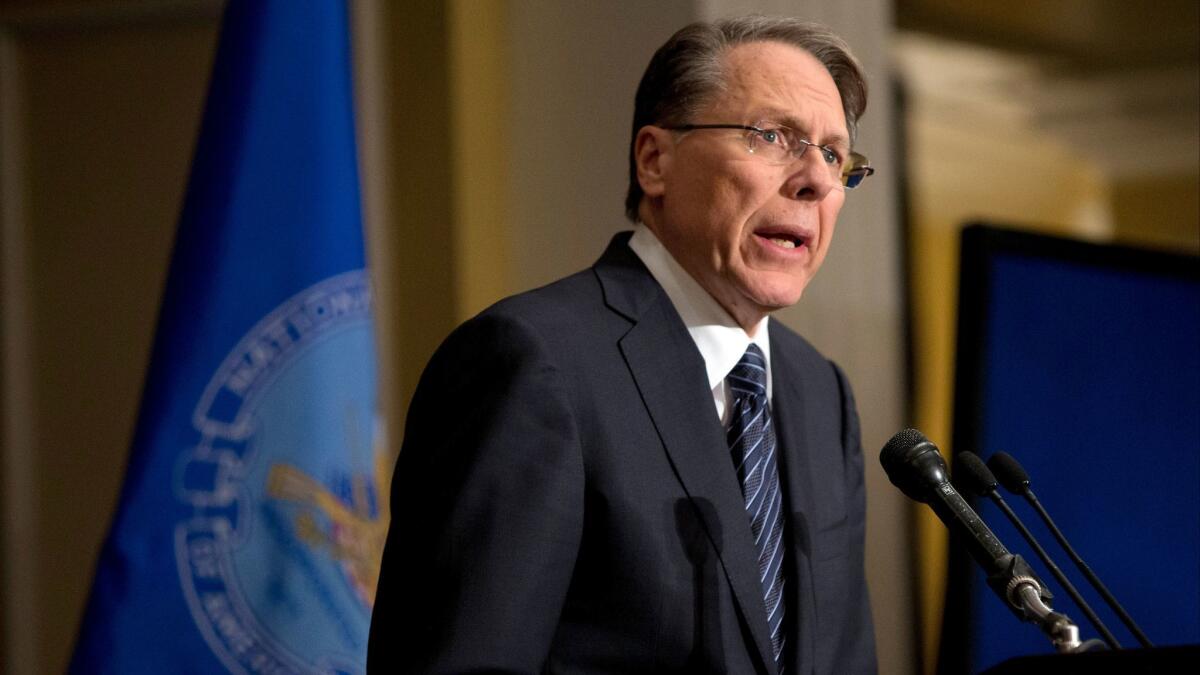Column: An appeals court overturns Florida’s gag law preventing doctors from asking about guns in the home

- Share via
Delivering a smidgen of good news in America’s battle against gun violence, an 11-member panel of a federal appeals court in Atlanta overturned a Florida law prohibiting doctors from asking their patients about guns in their homes.
Florida’s so-called Firearms Owners’ Privacy Act, or FOPA, was enacted in 2011 and immediately took its place as one of the stupidest gun-rights statutes on the books. The measure prohibited physicians from asking their patients about gun or ammunition ownership or the presence of a firearm in the home, except in limited cases. Doctors were forbidden to enter any information from the patients into their medical records and were required to “refrain from unnecessarily harassing” patients about gun ownership. The penalties for violations ranged as high as suspension of the doctors’ licenses.
In a ruling Thursday, the 11th Circuit Court of Appeals ruled almost all of the measure unconstitutional, adding some well-chosen words about the sheer sloppiness of the legislative enactment process and implying that the lawmakers were at least partially under the thumb of the National Rifle Assn.
There is no claim that questions to patients about the ownership of firearms are medically inappropriate, ethically problematic, or practically ineffective.
— U.S. Appeals Court, overturning Florida law prohibiting doctors from asking patients about gun ownership
The Florida law had been invalidated by a U.S. district judge in 2012 in a lawsuit known popularly as the “Docs vs. Glocks” case. A three-judge panel of the 11th Circuit Court reversed the district court and upheld the law in 2015. Now, that panel has been overruled by the 11 judges sitting en banc.
In Thursday’s decision, the judges found the Florida act’s prohibitions to be impermissible infringements on doctors’ freedom of speech. Such infringements are allowed when they’re narrowly tailored to serve a higher public purpose. The appeals judges found that the Legislature’s purpose was illegitimate. As Judge Charles R. Wilson wrote in a concurring opinion, the legislators were making a “subversive attempt to stop a perceived political agenda.” He explained, “The concern motivating the law was firearm-safety messages that were perceived as a political agenda against firearm ownership.”
In fact, the judges observed, doctors who asked about guns in the home, especially when the homes contained children, were upholding the highest professional principles.
Medical organizations concluded long ago that unsecured guns in the home “increase the risks of injury, especially for minors and those suffering from depression or dementia,” as even Florida state officials had acknowledged in a lower court. For decades, the American Medical Assn. and the American Academy of Pediatrics have advised doctors to ask about household guns as a pathway to childproofing the home and “to educate patients to the dangers of firearms to children.” Florida law, indeed, makes it a crime to leave unsecured guns in homes where they could be reached by children.
Despite all this, Florida legislators were stampeded by gun-rights advocates. At a hearing in 2011, lawmakers heard six anecdotes documenting so-called abusive questioning by doctors. A couple told patients that refusing to answer the questions would affect their Medicaid claims.
The Legislature also heard from an NRA representative, who testified that “questioning patients about gun ownership to satisfy a political agenda … needs to stop.”
A study last year by Garen Wintemute of UC Davis found that although three other states — Montana, Minnesota and Missouri — had laws limiting the collection of gun ownership information by medical professionals or agencies, Florida was the only state with a gag law. Wintemute also found that at least two-thirds of physicians believed they have “the right to counsel patients about firearms and a responsibility to engage in efforts to prevent firearm-related injuries.”
Despite all this, the appeals judges observed that “the Florida legislature, in enacting FOPA, relied on six anecdotes and nothing more.” The judges asked whether “in a state with more than 18 million people as of 2010,” six anecdotes was enough to establish an overarching state interest in silencing doctors. Their answer was no.
“There is no claim,” they wrote, “that questions to patients about the ownership of firearms are medically inappropriate, ethically problematic, or practically ineffective.”
Nor did the judges buy the state’s arguments that the Florida law was necessary to protect patients’ 2nd Amendment rights from being trampled by doctors, or to protect their gun ownership from being disclosed by doctors with their records. There was “no evidence whatsoever … that any doctors or medical professionals have taken away patients firearms” or otherwise infringed on their rights, the judges ruled. Nor is there any evidence that doctors have been “improperly disclosing patients’ information about firearm ownership.” None of the six anecdotes, as it happened, even touched on that issue.
The overruling is an important blow against the NRA’s agenda of suppressing public information about gun violence; it’s part and parcel of the campaign that has blocked federal funding for research into gun violence for 20 years.
Statutes like Florida’s show how far gun-rights fanatics will go to protect their perceived 2nd Amendment rights; in this case, they were willing to interfere with a doctor-patient relationship. That shows how little they really care about the public welfare, and it’s a relief that the appeals court called them on it.
Keep up to date with Michael Hiltzik. Follow @hiltzikm on Twitter, see his Facebook page, or email [email protected].
Return to Michael Hiltzik’s blog.







